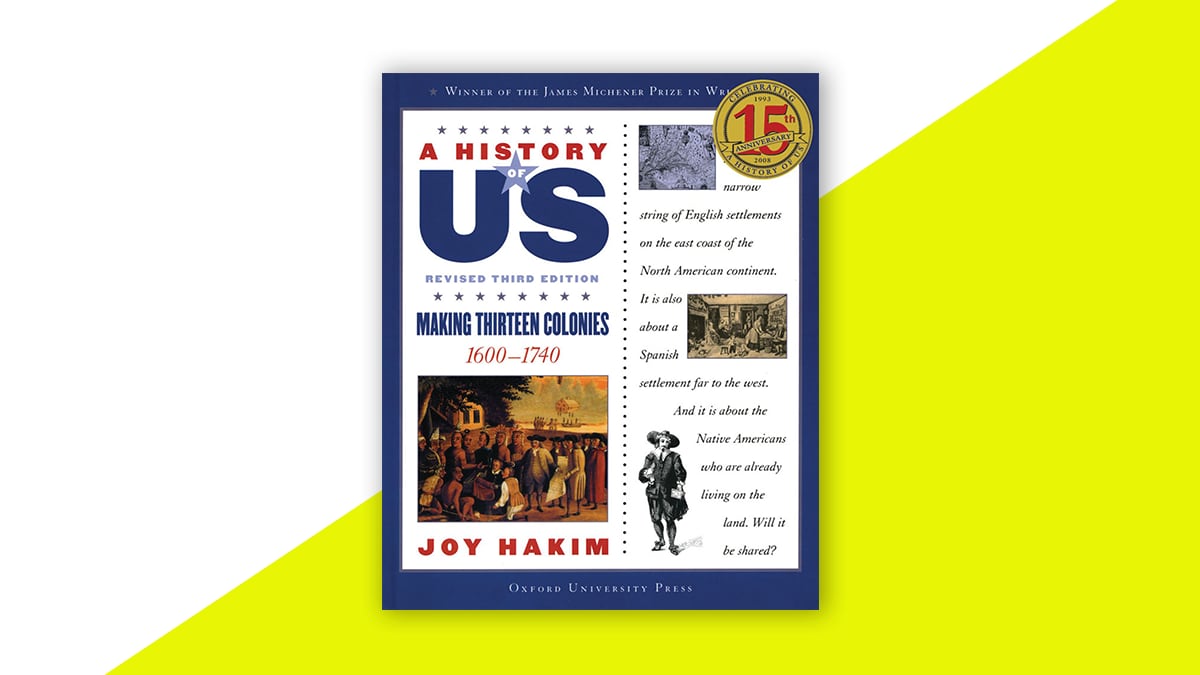Nearly two years ago, a parent at Capitol Hill Elementary in Southwest Portland complained that her daughter’s history textbook was racist and degrading. Now she’s learned that it was listed as an academic standard for fourth and fifth graders in Oregon.
The 10-book series by Joy Hakim, A History of US, was listed in 2010 among Oregon’s Common Core State Standards for English Language Arts & Literacy.
The books: Danielle Blake, parent of a then-fifth grader at Capitol Hill Elementary, complained about A History of US to her daughter’s teacher, Christopher Naze, in 2019 when she noticed how the books inaccurately depicted Indigenous and Black people and immigrants. WW first reported on her concerns earlier this spring (“Missing History,” March 3, 2021.)
“There’s a lot of stereotypes presented in these books and inaccurate history,” Blake says, “and this book sets the benchmark on how students should be developing academically.”
On page 82 of Book 7, for example, Hakim writes that “peaceful settlers who moved west to farm were often innocent victims of angry Indians.”
Assistant professor Shanté Stuart McQueen of Portland State University’s College of Education says she’s encountered a lot of questionable and generic textbooks, both personally and as an educator. This book still shook her.
“To me, when I read that, even though I can’t be surprised, I still read it with my jaw open,” McQueen says. “How can somebody write this with their fingers knowing what really took place? The quotes not only dehumanize slaves and have no connection to their humanity whatsoever, but they humanize the slave owners.”
Hakim, the books’ author, tells WW via email that while her series has been generally well received, she thinks the books need a major revision. They were first published in 1993, she points out, and have received only minor tweaks since then.
“No question, I want the books to be without bias. But they were written some years ago; we have changed as a nation since then,” Hakim writes. “I have been talking to Oxford [University Press] about an update of the series, and I am not only open to comments and suggestions, I’m eager for them.”
An external review is being done by subject matter experts, says Damon Zucca, OUP’s director of content development and reference. “Decisions about updating the books will be based on what we glean from this process and subsequent discussions with Joy,” Zucca adds.
The standards: Meanwhile, Blake says she’s still waiting for Portland Public Schools to take action. “Our schools have an obligation whenever concerns are raised,” she says. “I’ve been waiting 11 months for this to be done.”
While waiting, Blake says she’s discovered the book isn’t just on the syllabus for PPS students. It remains posted on the Oregon Department of Education website as an example of the type of texts that should be used to teach fourth and fifth graders.
In 2010, Oregon decided to adopt Common Core standards for measuring reading proficiency, among other subjects. Listed that year as an exemplary text? A History of US, next to Hurricanes: Earth’s Mightiest Storms and The Black Stallion.
State standards have since been updated, most recently in 2019, and Hakim’s series isn’t listed in more recent documents. But the 2010 list remains available on the state’s website.
ODE spokesman Marc Siegel tells WW the school district’s choice of curriculum is out of the state’s hands. “It is outside of the scope for the Oregon Department of Education to independently evaluate and assess individual textbooks outside of an official adoption review process,” Siegel wrote in an email to WW. “That said, this text was not part of ODE’s 2018 social science instructional materials adoption process.”
PPS spokeswoman Karen Werstein says the district is concerned about the material.
“This particular text is one that we believe needs improvements to reflect our theory of action and our Racial Equity Social Justice (RESJ) framework,” Werstein wrote in an email.
A review is underway, Werstein says, although she did not specify a timeline.
The criteria used when selecting texts for Oregon’s Common Core State Standards are complexity, quality and range. Blake questions the quality of A History of US.
“In my opinion, ‘quality’ texts wouldn’t contain confusing and awkward sentences while characterizing immigrants [as] ‘mostly poor, or troubled, or persecuted, or kidnapped, or adventuresome,’” Blake says.
Heather Villanueva, a parent of one of Blake’s daughter’s classmates, says she found the textbooks so appalling she would discard her child’s homework sheets. She also says Blake’s treatment by the district was unacceptable.
“PPS has been saying that they’re making equity a priority, and this felt very disconnected with that,” Villanueva says. “It felt like they were shutting her down from even having a conversation on it. It makes me feel sad and disappointed.”

